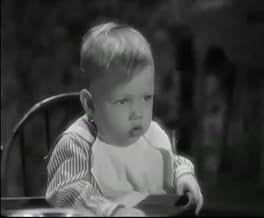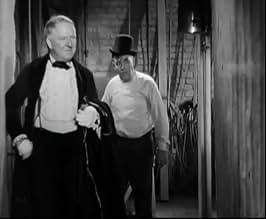Füge eine Handlung in deiner Sprache hinzuThe Great McGonigle and his troupe of third-rate vaudevillians manage to stay one step ahead of the bill collectors and the sheriff.The Great McGonigle and his troupe of third-rate vaudevillians manage to stay one step ahead of the bill collectors and the sheriff.The Great McGonigle and his troupe of third-rate vaudevillians manage to stay one step ahead of the bill collectors and the sheriff.
- Auszeichnungen
- 2 wins total
- Girl in Audience
- (Nicht genannt)
- Mr. Livingston
- (Nicht genannt)
Empfohlene Bewertungen
This is a period film and it goes back to the turn of the last century right about the time when a young juggler named W.C. Fields was going into vaudeville. The Old Fashioned Way offers us a rare treat to see Fields doing the juggling act which he started in show business with. I'm sure Fields drew from his experiences way back when to both write the original story on which the film is based and to give his usual good performance.
The film has a musical score of mostly old public domain standards, but the songwriting team of Mack Gordon and Harry Revel wrote a couple of original songs for the film. Gordon and Revel were with Paramount at the time, but would soon move to 20th Century Fox where they wrote a number of songs Alice Faye introduced. Morrison has a nice tenor voice and a pleasing, but somewhat limp personality. He does the best known song from the film, Poor Folk well with his tenor, but I have a bootleg radio recording of Russ Columbo doing it on one of his radio shows. Russ's baritone is far more suitable to the number than Morrison's tenor.
Still the show in this film is Fields and no one comes near stealing this film from him. Actress Jan Duggan plays the rich spinster who has stage ambitions and who Fields courts relentlessly, even putting himself through the torture of hearing her sing a really stupid song about gathering sea shells. Duggan would play Bill Fields's foil in several more film after The Old Fashioned Way.
Fans of the eternal Fields will like The Old Fashioned Way and if you see it you'll become a fan of W.C. Fields.
I saw "The Old Fashioned Way" about 30 years ago for the first time and, except for the juggling act and Baby Leroy scene, thought it was pretty innocuous. Of course, I was only a teenager back then and actually thought that "Billy Jack" was the greatest dramatic movie of the 20th century. I'm also ashamed to say that I thought Chevy Chase was actually funny. Ugh! As my tastes matured, I began to realize that so many aspects of life are beyond our control, and all one could ever hope to do was to learn not to take life so seriously. That, I believe, is why W. C. Fields' sense of humor is timeless and continues to relate to future generations.
The next time you watch a W. C. Fields movie, look closely and you may find certain aspects of yourself within Fields' character. Why do you think Homer Simpson has lasted so long??? If you take what has been said in this review into consideration, you will cherish this film for years to come. Fix yourself a dry Martini and enjoy the movie.
The film, as such, relies more on atmosphere than the typical Fields 'sketches' and this, perhaps, lends it a charm - and a freshness - that it wouldn't otherwise possess. Among its many notable scenes are: Fields thinking the military reception waiting at the train station is for his troupe's benefit; the dinner sequence with a rampaging, famished troupe and Fields' hilarious encounter with Baby LeRoy (who throws food at him and drops his watch into a jar of molasses) - Fields manages to get even with the child by kicking him when no one's watching!; the rich old lady's cringe-inducing singing audition, with the star reacting accordingly (he's hoping to secure her financial backing for the play the troupe will be presenting in town by promising her a role in it - this is eventually whittled down to a single line, which she's never even called upon to deliver!); Fields falling off the stage during rehearsals, etc.
"The Drunkard" set-piece occupies a good deal of the second half: a hoary melodrama which the troupe performs with gusto - with Fields as the mustachioed and hissable villain of the piece who, at one point, reprises the immortal line from his short THE FATAL GLASS OF BEER (1933) "'T ain't a fit night out for man nor beast". With the closing of each act, the curtain comes crashing down making a loud thumping sound; still, the film is clearly intended as a valentine to the days of vaudeville - and even includes a wonderful juggling routine towards the end that showcases Fields' amazing dexterity (in spite of his advancing age, corpulent physique and propensity for booze).
The final sequence finds The Great McGonigle keeping busy as a medicine showman - having left his daughter behind, so as not to interfere with her happiness alongside a stage-struck boy emanating from a respectable family. Typically, for comedies from this era, romance and songs have been incorporated into the narrative as much as a device by which to counterbalance the star's antics as for purely commercial reasons (since these films were largely intended for family consumption).
Wusstest du schon
- WissenswertesW.C. Fields recreates his famous vaudeville juggling routine with the cigar boxes.
- PatzerBetty is described as the leading lady of the troupe--as one would expect, since she is The Great McGonigle's daughter. But she takes no part in the show; another actress plays the female lead.
- Zitate
Dick Bronson: Mr. McGonigle, I've got to have some money.
The Great McGonigle: Yes, my lad, how much?
Dick Bronson: Two dollars.
The Great McGonigle: If I had two dollars, I'd start a number two company.
Dick Bronson: For two cents I'd quit.
The Great McGonigle: [to Marmaduke] Pay him off!
[Marmaduke gives him a two cent stamp]
- Crazy CreditsThe end credits are in 2 parts; the first contain the actors and their character names in the film as a whole; The second contains the actors and their character names in the play, "The Drunkard." Five actors, therefore, are credited twice: W.C. Fields, Joe Morrison, Judith Allen, Samuel Ethridge and Ruth Marion.
- VerbindungenFeatured in Hollywood: The Gift of Laughter (1982)
- SoundtracksWe're Just Poor Folks Rolling in Love
(1934) (uncredited)
Lyrics by Mack Gordon
Music by Harry Revel
Sung by Joe Morrison
Top-Auswahl
Details
- Erscheinungsdatum
- Herkunftsland
- Sprache
- Auch bekannt als
- Die gute alte Zeit
- Drehorte
- Produktionsfirma
- Weitere beteiligte Unternehmen bei IMDbPro anzeigen
- Laufzeit
- 1 Std. 11 Min.(71 min)
- Farbe
- Seitenverhältnis
- 1.37 : 1


















